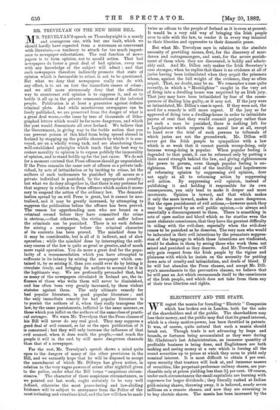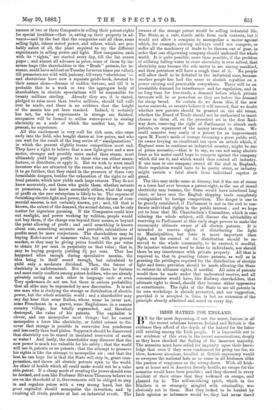ELECTRICITY AND THE STATE.
Wii regret the mania for founding " Electric " Companies which has broken out in London, both for the sake of the shareholders and of the public. The shareholders may lose their money, and the public may find that its grand interest, which is a cheap motive-power, has been throttled in patents. It was, of course, quite natural that such a mania should break out. Though trade is not advancing by leaps and bounds, or fortunes being accumulated as they were during Mr. Gladstone's last Administration, an immense quantity of profitable business is being done, and Englishmen are both making and saving money at a rate which is forcing all the sound securities up to prices at which they seem to yield only nominal interest. It is most difficult to obtain 4 per cent. upon security. that trustees will look at, and immense masses of securities, like perpetual-preference railway shares, are pur- chasable only at prices yielding less than 3-1.- per cent. Of course, under such circumstances the small capitalists are burning with eagerness for larger dividends ; they literally rushed at Indian gold-mining shares, throwing away, it is believed, nearly seven millions on a remote chance, and now they are swarming in to buy electric shares. The mania has been increased by the
success of two or three Companies in selling their patent-rights for special localities—that is, eating up their property in ad- vance—and by the fact that the companies suit all ideas, some selling light, others stored power, and others, which are pro- bably safest of all, the plant required to try the different experiments in selling power and light. New companies, each with its " rights," are started every day, till the list covers pages ; and almost all advance in price, some of them by im- mense leaps (the shareholders in the "Brush" patents, for in- stance, could have soldout on Tuesday forseven times par value), till promoters are wild with jealousy, till every "electrician "- and electricians have now a separate guide-book, devoted to their names alone—dreams of sudden fortune, and till it is probable that in a week or two the aggregate body of shareholders in electric speculations will be responsible for twenty millions sterling. Already they are, it is stated, pledged to raise more than twelve millions, should full calls ever be made, and there is no evidence that the height of the mania has yet been reached. Indeed, it certainly has not, for when experiments in storage are finished, companies will be formed to utilise water-power in storing electricity on a scale of which the market has, for the present, no experience.
All this excitement is very well for rich men, who came early into the field, who bought shares at low prices, and who can wait for the result of the long series of " amalgamations " in which the present slightly insane competition must end. They have a right to believe that a new light-giver and a new motor, stronger and possibly more useful than steam, must ultimately yield large profits to those who can either manu- facture, or distribute, or apply it. But we wish to warn small investors who are attracted by the recent rise, and who expect it to go further, that they stand in the presence of three very formidable dangers, besides the exhaustion of the right to sell local patents, which now yields such large returns. They do not know accurately, and those who guide them, whether savants or promoters,• do not know accurately either, what the range of profit on the new enterprises is likely to be. The expense of furnishing electric light and power, the very first datum of com- mercial success, is not certainly known, yet; and, till that is known, the extent of the demand, the second datum, can be only matter for ingenious guessing. If the Companies could hire out sunlight, and power working by volition, people would not buy.them, if the charge was beyond their means, or beyond the point allowing of profit ; and until something is known about cost, something accurate and provable, calculations of profits must be mere conjectures. The shareholders may be buying Koh-i-noors of immense value, but with no general market, or they may be giving prices fourfold the par value to obtain 10 per cent. in perpetuity on that value ; that is may be buying property yielding 22 per cent. That has happened often enough during speculative manias, the idea being in itself sound enough, but calculated to yield only a moderate dividend. Then, the future of electricity is undetermined. Not only will there be furious and most costly conflicts among patent-holders, who are already privately raving at each other in language such as even Tory spokesmen do not use, but there is serious probability that all alike may be superseded by new discoveries. It is not one man who is studying the storage or distribution of electric power, but the whole scientific world ; and a shareholder may any day hear that some Italian, whose name he never saw, some Frenchman in a garret, some Englishman in a remote country village, has totally superseded, and therefore destroyed, the value of his patents. The capitalist is clever, and can monopolise most things; but he cannot monopolise a force like electricity, or forbid science to dis- cover that storage is possible in reservoirs less ponderous and less costly than lead plates. Suppose it should be discovered that electricity can be stored in insulated reservoirs of earth or water $ And lastly, the shareholder may discover that the new power is much too valuable for his safety ; that the world will use it, patents or no patents ; that the attempt to preserve his rights is like the attempt to monopolise air ; and that the beat he can hope for is that the State will step in, grant com- pensation, and throw all electric patents open to the world. An elixir of health which all could make would not be a valu- able patent. If a cheap mode of creating the power should ever be devised, and men like Professor Silvanus Thomson believe we are on the threshold of it, Governments will be obliged to step in and regulate prices with a very strong hand, lest the great capitalist should monopolise .the invention, and by crushing all rivals, produce at last an industrial revolt. The
owners of the storage patent would be selling industrial life. The State, as a rule, stands aside from such contests, but it would not allow a company to monopolise a motor against which, for example, existing railways could not compete, or suffer all the machinery of trade to be thrown out of gear, in order that one shipowning company should undersell the whole world. It is quite possible, more than possible, if the problem of utilising falling water to store electricity is ever solved, that electricity may become the sole motor in use among mankind, and then patentees will have a rough time of it. No people will allow itself to be defeated in the industrial race, because another people has had the sense to abolish royalties on a power existing and procurable everywhere. There will be an irresistible demand for interference and for regulation, and in no long time for free-trade, a demand before which private interests will be as powerless as they are before the demand for cheap bread. So certain do we deem this, if the new motor succeeds, as savants believe it will succeed, that we doubt whether new patents should be granted on the old terms, whether the Board of Trade should not be authorised to insert clauses in them all, on the precedent set in the first Rail- way Acts, reserving the right of Parliament to absorb such patents, on repayment of the money invested in them. We could conceive very easily of a patent for an improvement upon M. Faure's mode of storage becoming a great public evil, its owner levying an exorbitant tax upon an article which, if England were to continue an industrial country, might be one of prime necessity,—that is to say, no one not using electric force as his motor could hope to compete against the company which did. use it, and which would thus control all industry. If one man or one company owned all the coal in England, State regulation would have to be pretty strict, or industry might sustain a fatal shock from individual caprice or greed.
The idea may strike some as dreamy, but if the use of steam as a force had ever become a patent-right, as the use of stored electricity may become, the State would have interfered long since, or have seen the English shipping trade completely extinguished by foreign competition. The danger is one to be gravely considered, if Parliament is not in the end to con- fiscate individual rights in the public interest ; and we hope yet to hear that Mr. Chamberlain's Committee, which is con- sidering the whole subject, will discuss the advisability of reserving to Parliament at this early stage powers to make the community ultimate owner of all electric patents. It is intended to reserve rights of distributing the light to Municipalities, but force is more important than light, and the control of its distribution should be re- served to the whole community, to be exerted, if needful. No injustice whatever need be done to individuals, nor should there be any interference with private property. All that is required is, that in granting future patents, as well as in granting the privileges required for the distribution of electric light and force, provision should be made allowing the State to enforce its ultimate rights, if needful. All sales of patents would then be made under that understood reserve, and all concessionnaires would have, like Railway shareholders, that ultimate right to dread, should they become either oppressive or extortionate. The right of the State to use all patents in its own workshops is already protected, and our suggestion, provided it is accepted in time, is but an extension of the principle already admitted and acted on every day.

































 Previous page
Previous page